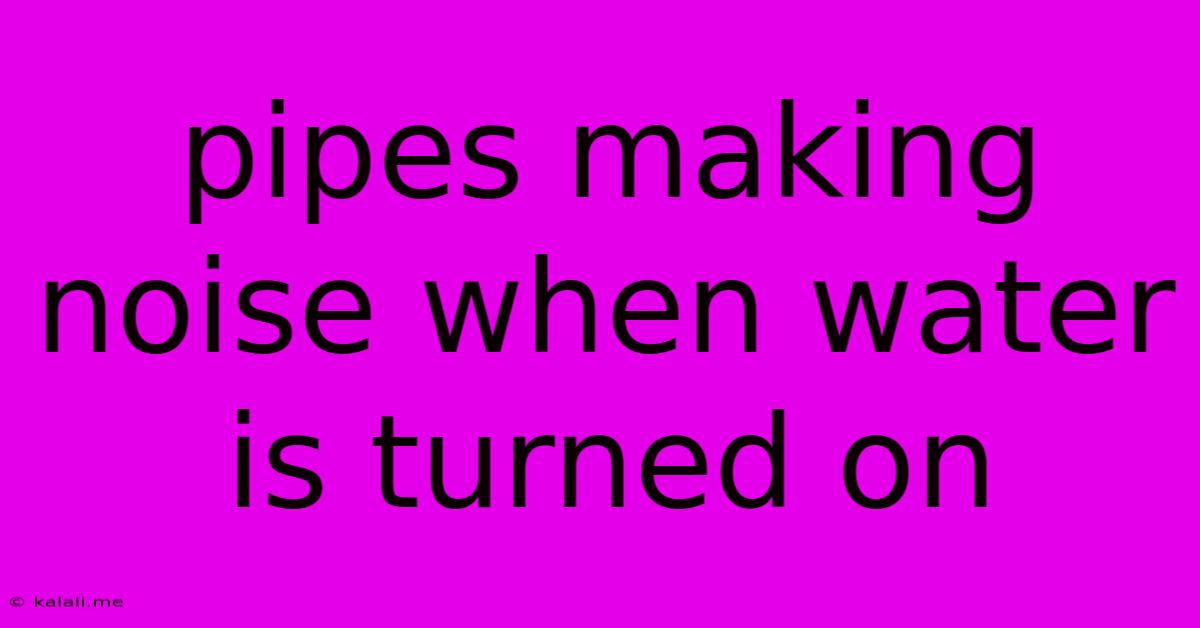Pipes Making Noise When Water Is Turned On
Kalali
Jun 05, 2025 · 3 min read

Table of Contents
Pipes Making Noise When Water is Turned On: Troubleshooting and Solutions
Are you suddenly awakened by loud banging or whistling noises emanating from your pipes whenever you turn on the water? This frustrating problem, often described as "water hammer," can stem from several sources. This article will explore the common causes of noisy pipes and offer practical solutions to restore peace and quiet to your home. Understanding the root cause is key to effectively silencing those disruptive sounds.
Why Do My Pipes Make Noise When the Water is Turned On?
The most common culprit behind noisy pipes is water hammer. This occurs when the rapid shutoff of water flow causes a pressure surge within the pipes. Imagine the water acting like a speeding train suddenly slamming on the brakes – the resulting shockwave creates the banging sound. However, other issues can also contribute to noisy pipes, including:
Common Causes of Noisy Pipes:
-
Water Hammer: As explained above, this is the most frequent cause. The sudden stop of water flow creates a pressure wave that impacts the pipes. This is often exacerbated by long pipe runs or high water pressure.
-
Loose Pipes: Pipes that are not properly secured can vibrate against surrounding structures, creating rattling or knocking sounds. This is particularly common in older homes or areas prone to settling.
-
Expansion and Contraction: As water heats and cools, pipes expand and contract. If these pipes are not properly installed or supported, this movement can create scraping or creaking noises.
-
Sediment Buildup: Mineral deposits and sediment inside pipes can restrict water flow, leading to increased turbulence and noise. This is more common in areas with hard water.
-
Faulty Valves: Worn-out or damaged valves can leak or create turbulence, resulting in hissing or whistling sounds. This is especially noticeable in older plumbing systems.
-
Air in the Pipes: Air trapped within the plumbing system can cause gurgling or banging sounds, particularly in low-lying sections of the piping.
Diagnosing the Source of the Noise
Pinpointing the exact location of the noise is crucial for effective troubleshooting. Listen carefully to determine where the noise is loudest. Is it near a specific fixture, such as a faucet or toilet? Knowing this will help you focus your efforts on the appropriate section of the plumbing system. You can also consider using a plumbing snake to check for possible clogs in the pipework.
Solutions for Quieter Pipes:
-
Water Hammer Arrestors: These inexpensive devices are specifically designed to absorb the shock waves caused by water hammer. They are usually installed near fixtures where the noise is most prominent.
-
Pipe Clamps and Straps: Secure loose pipes using clamps or straps to prevent vibrations and rattling. Make sure the pipes are firmly attached to the joists or framing.
-
Insulation: Wrapping pipes with insulation can reduce noise from expansion and contraction, as well as helping with general temperature regulation.
-
Professional Plumbing Inspection: If you are unable to identify the cause of the noise or are uncomfortable working with plumbing yourself, it is always best to call a qualified plumber. They possess the expertise to diagnose and solve complex plumbing issues effectively and safely.
-
Regular Maintenance: Flushing your pipes periodically can help remove sediment buildup and improve water flow. This simple maintenance task can go a long way in preventing noise problems.
By understanding the potential causes of noisy pipes and applying these solutions, you can restore peace and quiet to your home. Remember, addressing the root cause is crucial for long-term success. If the noise persists after trying these solutions, contacting a qualified plumber is recommended. They have the tools and expertise to diagnose and resolve more complex plumbing issues, ensuring the longevity and efficiency of your plumbing system.
Latest Posts
Latest Posts
-
Diiference Brew Ollama Cask And Formulae
Jun 06, 2025
-
Add Column If Not Exists Postgres
Jun 06, 2025
-
How To Remove Pvc Pipe From Fitting
Jun 06, 2025
-
Meaning Of You Know The Drill
Jun 06, 2025
-
How To Use King James Version Bible In Your Copyright
Jun 06, 2025
Related Post
Thank you for visiting our website which covers about Pipes Making Noise When Water Is Turned On . We hope the information provided has been useful to you. Feel free to contact us if you have any questions or need further assistance. See you next time and don't miss to bookmark.